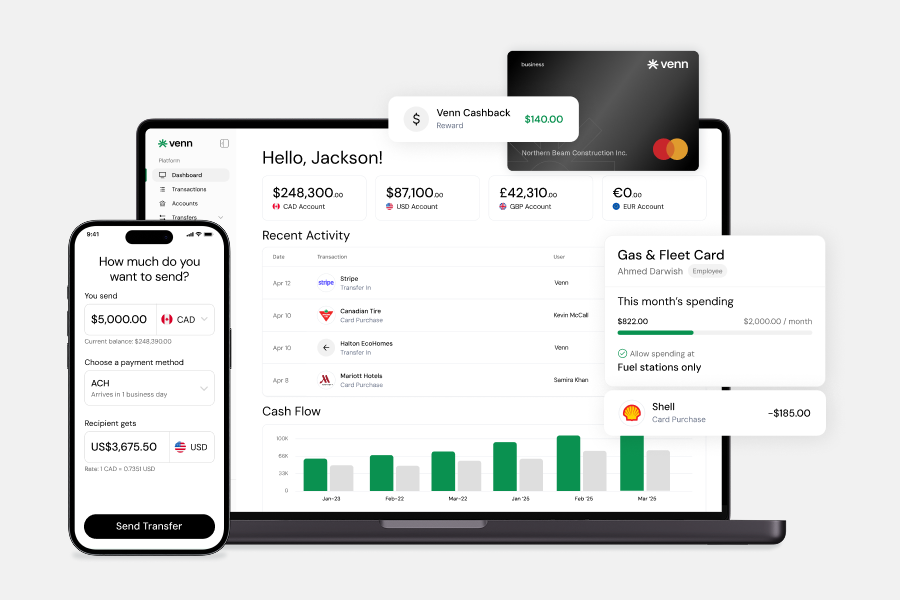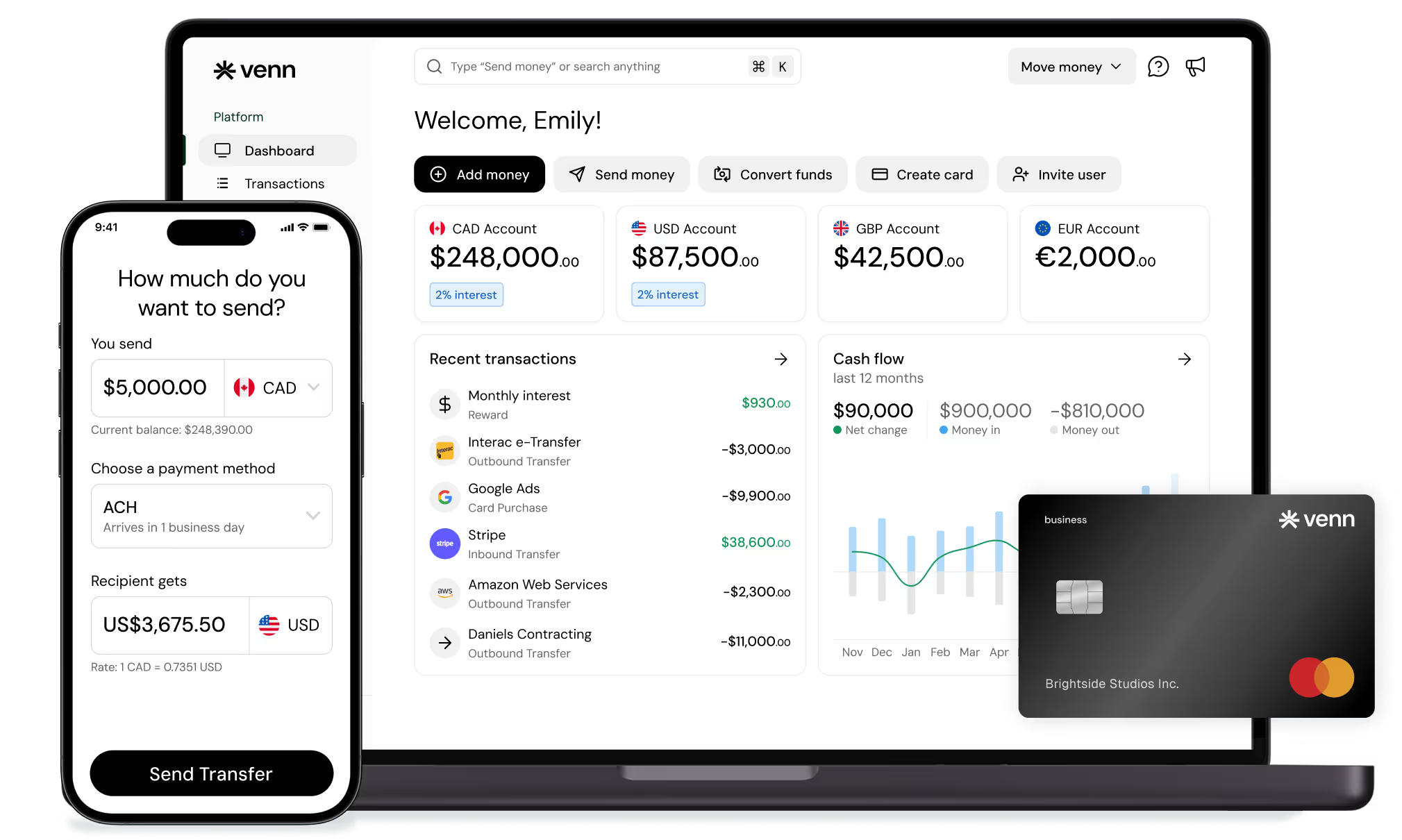How to Register a Business in Ontario: What Entrepreneurs Need to Know
Learn how to register a business in Ontario with this complete guide. Covers name registration, CRA Business Numbers, incorporation vs registration, and more.


Trusted by 5,000+ Canadian businesses
Business banking for Canada
Local CAD and USD accounts, corporate cards with cashback, the lowest FX rates in Canada, free local transfers, and more.
Whether you're launching a side hustle or scaling a full-time venture, one of the first legal steps to operating in Ontario is registering your business. And while the process is relatively straightforward, it’s also easy to confuse business registration with incorporation, or overlook when you’re required to register federally with the CRA.
This guide walks you through what it means to register a business in Ontario, how it differs from incorporation, and how to stay compliant at both the provincial and federal levels. You'll also find practical tips, cost breakdowns, and a step-by-step walkthrough of the process.
Key distinctions we’ll cover:
- When you need to register a business name in Ontario
- When to register with the CRA (Canada Revenue Agency)
- The difference between business registration and incorporation
- How registration connects to taxes, permits, and financial operations
We'll also briefly cover Venn's new incorporation product, the cheapiest and fastest way for Canadians to get their business incorporated.
Who Needs to Register a Business in Ontario?
Not every business in Ontario needs to incorporate, but most will need to register, especially if they’re operating under a name other than their legal personal name or plan to hire employees, collect HST, or open a business account. Understanding whether you need to register is essential for compliance with Ontario’s Business Names Act and CRA tax rules.
Sole Proprietorships
If you're running a one-person operation under your own legal name (e.g., Jamie Chen Consulting), you typically don’t need to register. But as soon as you operate under a business name (e.g., Summit Advisory Group), you're legally required to register that name with the Ontario Business Registry.
You’ll also likely need to register with the CRA if you:
- Hire employees (payroll program)
- Collect or expect to collect more than $30,000 annually (GST/HST number)
- Import or export goods (import/export program account)
Venn now supports sole proprietorships, making it easier for freelancers and self-employed Canadians to access modern financial tools.
Partnerships
Operating a business with one or more partners? You must register the business name in Ontario, and identify all partners. You’ll also likely need to register for a Business Number (BN) and relevant CRA program accounts, depending on your activities and revenues.
Incorporated Businesses
If you incorporate provincially or federally, you’re automatically registered as a legal entity. However, additional steps may still apply:
- Provincial incorporation (with Ontario) means you don’t need to register the business name separately, it’s part of incorporation.
- Federal incorporation (with Corporations Canada) gives broader name protection but requires extra-provincial registration in Ontario if you operate there.
Business Name Registration in Ontario
Registering your business name is one of the first steps in making your business official, and it's required if you're not operating under your exact legal name. In Ontario, this process is managed through the Ontario Business Registry (ServiceOntario), and it applies to sole proprietorships, partnerships, and corporations using a “trade name” or “doing business as” (DBA) identity.
When Do You Need to Register a Business Name?
You must register your business name if:
- You're operating a sole proprietorship under a name other than your own full legal name
- You're forming a partnership or general partnership
- You're a federal corporation operating in Ontario (you’ll need to register your business name provincially too)
If you incorporate provincially in Ontario, the name registration is included in the incorporation process.
Choosing and Searching a Business Name (NUANS)
Before registering your name, you should perform a NUANS name search (Newly Updated Automated Name Search). This helps you:
- Avoid legal disputes or duplication
- Check for conflicts with existing trademarks or business names
While a NUANS search is optional for sole proprietorships, it’s mandatory if you’re incorporating.
Where and How to Register
You can register your business name online through the Ontario Business Registry. You’ll need:
- A valid business name
- Owner information (or corporate structure if applicable)
- Payment method for the registration fee
Cost: ~$60–$80 depending on the method
Renewal: Business name registrations are valid for 5 years and must be renewed to remain active.
Registering for CRA and Federal Programs
Even if you've registered your business name in Ontario, you're not quite done, you may also need to register federally with the Canada Revenue Agency (CRA). This step depends on your business activities, not just your structure.
What Is a CRA Business Number?
A Business Number (BN) is a 9-digit number that acts as your unique identifier with the CRA. You’ll need this number to access and manage federal program accounts like:
- GST/HST
- Payroll deductions
- Import/export
- Corporation income tax (if incorporated)
When Do You Need to Register with the CRA?
You must register for a Business Number and applicable program accounts if you:
- Expect to earn $30,000+ in revenue over four consecutive calendar quarters
- Plan to hire employees and remit source deductions
- Will be importing or exporting goods or services
- Are incorporating (federal or provincial)
Provincial vs Federal Incorporation: What’s the Difference?
Many entrepreneurs conflate registering a business with incorporating it, but these are legally distinct actions. While business registration simply allows you to operate under a chosen name, incorporation creates a separate legal entity with added protections and obligations.
Once you decide to incorporate, your next choice is where, federally or provincially.
Provincial Incorporation (Ontario)
Incorporating provincially means your business is legally recognized within Ontario only. You’ll register through the Ontario Business Registry, and your corporate name is protected only in the province.
Advantages:
- Simple process through ServiceOntario
- No need to register extra-provincially if only doing business in Ontario
- Lower annual filing requirements
Consider this if:
- You operate only in Ontario
- You don’t need national name protection
- You want a simpler setup with lower costs
Federal Incorporation (Corporations Canada)
Federal incorporation provides national name protection, meaning your corporate name is protected across all provinces and territories. However, if you're operating in Ontario, you’ll still need to register extra-provincially.
Advantages:
- National name protection
- May enhance credibility for national or international operations
Consider this if:
- You operate (or plan to) in multiple provinces
- You want broader branding protection
Registration ≠ Incorporation
Registering a business name gives you the legal right to operate under a name, but it does not create a corporation or offer limited liability. Incorporation gives you a legal structure, better tax planning tools, and protection for personal assets — but requires more compliance and cost.
Step-by-Step: How to Register a Business in Ontario
Whether you’re registering a sole proprietorship or incorporating provincially, the process is manageable — especially if you know what to expect. Here’s a breakdown of what you’ll need to do:
Step 1: Choose Your Business Structure
- Sole Proprietorship – You run the business as yourself
- Partnership – You run it with one or more partners
- Corporation – You form a legal entity separate from yourself
Tip: This affects your tax filing, liability, and compliance, so if unsure, speak with a lawyer or accountant.
Step 2: Pick a Business Name
- Must be unique and not misleading
- Optional: Run a NUANS name search to check availability (mandatory for incorporation)
You can operate under your own legal name without registering a name, but any other business name must be registered.
Step 3: Register Your Business Name
Use the Ontario Business Registry to:
- Submit your business name and owner info
- Pay the registration fee (approx. $60–$80)
- Receive your Master Business Licence (MBL)
Valid for 5 years, must be renewed to stay active.
Step 4: Register for a CRA Business Number
Use CRA Business Registration Online to:
- Get your 9-digit Business Number (BN)
- Add any required program accounts:
- GST/HST (if over $30K revenue)
- Payroll (if hiring)
- Import/export
Step 5: Set Up Business Licences and Permits
Depending on your industry, location, or services, you may need:
- Municipal business licences
- Professional certifications
- Regulatory approvals (e.g., health or safety inspections)
Registering a Business vs. Using a Platform Like Venn
Registering your business is just the beginning. If you haven’t incorporated yet, Venn makes it easy to do so, right from the same platform where you’ll manage the rest of your business finances. Through Venn’s incorporation product, you can form your corporation online, with guidance that ensures you’re compliant from day one.
Once you’re set up legally, Venn helps you move straight into operations, no juggling between tools or waiting on banks.
Venn gives Canadian businesses an all-in-one financial platform to run their operations, not just register them. Unlike traditional providers or U.S.-based fintechs, Venn offers true Canadian and U.S. account access, so you can:
- Get a real USD account to send and receive ACH payments (no cross-border fees)
- Use one card across CAD, USD, GBP, and EUR, no need to swap or convert
- Send Interac e-Transfer® and EFT payments faster than banks or legacy tools
- Your working capital shouldn’t sit idle. Venn pays 2% interest on both CAD and USD balances.
- Sync everything with QuickBooks or Xero automatically
- Access uncapped 1% cashback on your corporate card spend
Just incorporated or registered? You can set up your Venn account online in minutes and get approved same-day, with no need to visit a branch.
Whether you're just launching or scaling up, Venn helps you spend smarter, pay faster, and stay in control of your financial operations from day one.
Frequently Asked Questions
Q: Do I need to register my business in Ontario?
Yes, most businesses do. You must register if you are operating under a name other than your full legal name, or if you are running a partnership or corporation. Even sole proprietors may need to register for a CRA Business Number if they expect to earn over the GST/HST threshold ($30,000 annually) or hire employees.
Q: What’s the difference between registering a business and incorporating in Ontario?
Registering (costing 8$\sim\$60$ for a sole proprietorship) simply gives you legal permission to operate under a specific business name.9 Incorporation (costing 10$\sim\$300$ for the filing fee) creates a separate legal entity from you, providing essential benefits like limited liability and potential corporate tax advantages.11
Q: How do I get a CRA Business Number?
The fastest and most common method is to use the CRA’s free Business Registration Online (BRO) portal.12 You can register for your 9-digit Business Number (BN) and essential program accounts (like GST/HST and Payroll) instantly online.13
Q: What happens after I register my business with the province?
After registering your business name, your next steps involve compliance and setup: 1) Obtaining your CRA Business Number and necessary program accounts (GST/HST, Payroll), 2) setting up your official business bank/financial accounts, and 3) securing any municipal or industry-specific licenses required to operate legally.
This publication is provided for general information purposes and does not constitute legal, tax or other professional advice from Venn Software Inc or its subsidiaries and its affiliates, and it is not intended as a substitute for obtaining advice from a financial advisor or any other professional. We make no representations, warranties or guarantees, whether expressed or implied, that the content in the publication is accurate, complete or up to date.
Venn is all-in-one business banking built for Canada
From free local CAD/USD accounts and team cards to the cheapest FX and global payments—Venn gives Canadian businesses everything they need to move money smarter. Join 5,000+ businesses today.

Frequently asked questions
Everything you need to know about the product and billing.
Venn is the cheapest and easiest way to manage your business banking needs. We offer the best currency exchange rates in Canada, chequing accounts in multiple currencies, domestic and international bank transfers, and a corporate Mastercard to manage all your spend. By signing up to Venn you automatically get:
- Accounts in Canadian dollars, US dollars, British pounds, and Euros
- The cheapest FX rates in Canada with free domestic transfers (EFT, ACH, SEPA, FPS)
- A Mastercard Corporate card that gets you the same great FX rates and cashback with no minimum spend requirements
Yes, Venn holds eligible deposits at our Partner Institution in our trust accounts, including deposits in foreign currencies. CDIC protects eligible deposits up to CA$100,000 per deposit category per CDIC member institution.
No, we don’t have any hidden fees! All charges, including currency conversion and premium plans, are clear and transparent. You can even issue unlimited corporate cards to your team and sign up with a free plan in minutes! Learn more about our transparent Pricing.
Nope! Other companies and traditional bank accounts have high minimum balance requirements. This makes accounts inaccessible for small businesses or individuals. Venn does not require a minimum balance. Your CAD and USD funds will also earn 2% interest regardless of the balance.
Our process is quick — Customers typically get set up in 5 minutes or less! Create a free account and start saving with no monthly fees, cashback on card spend, and the best FX rates around.
Of course! Our friendly Support specialists are available via Chat or Email 24 hours a day, 7 days a week, 365 days a year. All tickets are monitored and responded to within 24 hours, with an average response time of 30 minutes.
Yes, we have a direct integration with QBO and Xero. We are working on more integrations very soon!
Join 5,000+ businesses banking with Venn today
Streamline your business banking and save on your spend and transfers today
No personal credit check or guarantee.


